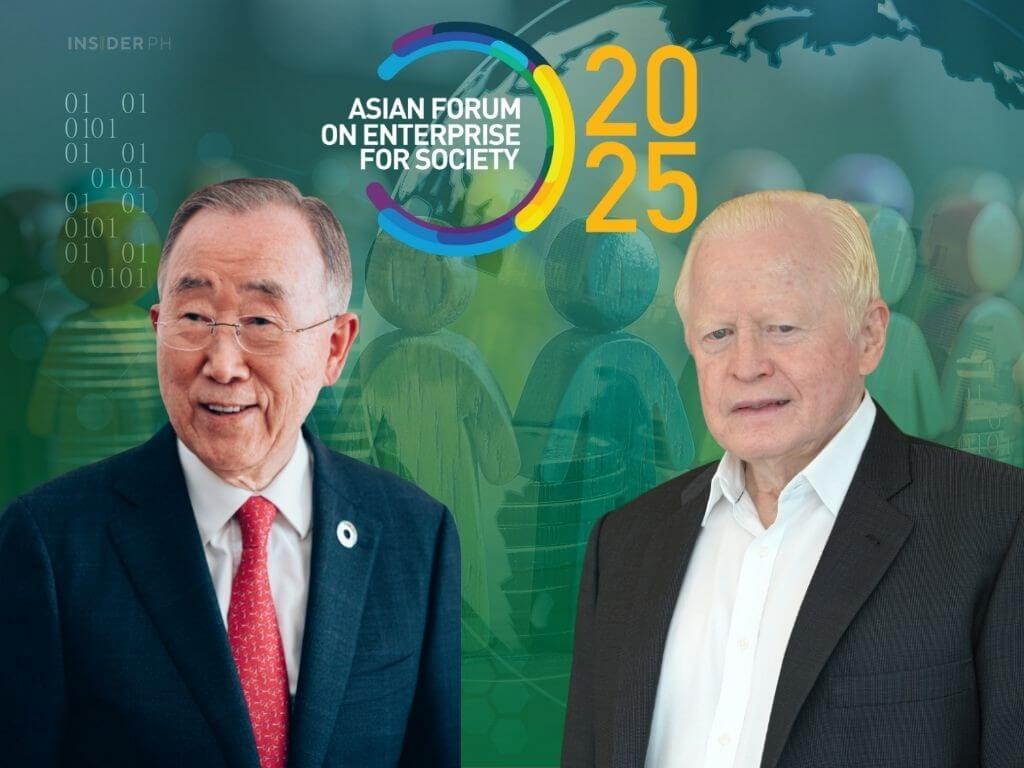

“We stand on the precipice of a period of pronounced change, one that will have profound implications for the enterprises, the future of humanity, and our planet Earth, the only planet Earth we have discovered until now,” he said during his speech at the fourth Asian Forum on Enterprise for Society (AFES) on Nov. 11.
Multiple crises
He also outlined some of the world’s most urgent challenges—climate change, rising geopolitical tensions, and the rapidly evolving risks and opportunities of artificial intelligence.
Addressing these intertwined crises, the 81-year-old statesman stressed, demands a united effort among nations.
These global disruptions, he argues, place even greater responsibility on enterprises to lead with purpose.
“Now, more than ever, we need global solutions underpinned by cooperation, solidarity, and elevated leadership to empower all global citizens to come together in partnership and help ensure a sustainable and peaceful future for all,” he said.
Humanity is facing a web of interconnected global challenges, he added, with impacts felt in every corner of the world. Addressing these crises demands collective and inclusive action focused on improving health, security, sustainability, and shared prosperity for all.
‘A powerful force’
Ban views artificial intelligence (AI) as a “powerful force” transforming every aspect of business. However, he noted that the coming decade will test how effectively leaders can balance innovation with responsibility.
AI offers major opportunities for advancing the Sustainable Development Goals, he said, but also presents challenges such as bias, privacy concerns, job loss, and the need for stronger digital governance and ethics.
Companies that succeed will be those that use AI responsibly, aligning it with ethical standards and human values.
“The future enterprise is not only data driven, it is human-centered, built on trust and transparency and inclusiveness. In short, AI is not replacing us. It is redefining what it means to be productive, creative, and intelligent,” Ban stressed.
Global citizens
As a private citizen, he jokes that he often finds himself repeating the same message — perhaps because it remains unfulfilled to this day.
His message: “I have often said, and will continue to say, that we must embrace global citizenship with a global vision. This has been my enduring message to the younger generation: ‘Be a global citizen with passion and compassion.’”
Ban describes climate change as an existential threat that demands urgent global attention. He emphasizes that addressing it depends not on a single leader, but on the collective will of humanity.
He pointed out that 2024 was the hottest year on record and said he regretted the United States’ withdrawal from the Paris Climate Agreement during the Trump administration.
As a former UN secretary general who helped establish the agreement, he described the move as irresponsible. He adds that climate change affects all nations and requires global cooperation to address.
Solutions are within reach
Despite the complex challenges confronting humanity, Ban remains optimistic that solutions are within reach — but he stressed that they must be grounded in partnership and inclusivity.
He emphasized the importance of collaboration across borders, cultures and generations to build a future centered on sustainability and empowerment for all.
“I am confident that we can change the world for the better for all the people around the world, if we are united, and if we share technologies and fundings. But to do so, we must come together in greater solidarity and urgency. We must find our common humanity,” he said.
Catalyst for change
In his remarks during the same event, Jose Cuisia Jr. pointed out that the forum, organized by the Asian Institute of Management, acts as a catalyst for innovation and ideas that drive positive change and contribute to the betterment of society.
Cuisia is the chief of the advisory board of the AIM Ramon V. del Rosario Sr. Center on Enterprise for Society.
Now in its fourth edition, the mission remains the same and that is to bring together current and future leaders, practitioners, and changemakers to explore the evolving role of enterprises in shaping a shared and purposeful future.
Multiple disruptions, Cuisia said, have not only transformed industries but also raised concerns about inequality, poverty and job displacement.
“These disruptions have forced governments, businesses, and communities to rethink priorities in navigating an increasingly uncertain future. For this year, the AFES theme, ‘Navigating Disruption: Enterprise Priorities for a Resilient Future,’ speaks to the reality we face daily,” said the former Philippine Ambassador to the United States.
Enterprises are stepping up
However, he noted that amid the turbulence, “something remarkable” is happening — enterprises are stepping up.
“From economic volatility and technological shifts to environmental and social transformation, enterprises, through their innovation, collaboration, and responsible leadership, are playing a vital role in addressing the complex challenges of our time,” Cuisia said.
Echoing Ban’s message, he said the solution to Asia's greatest challenges will emerge from its collective intelligence.
“The future isn't something that happens to us, it's something we create together, starting right now,” he says.

Content Producer